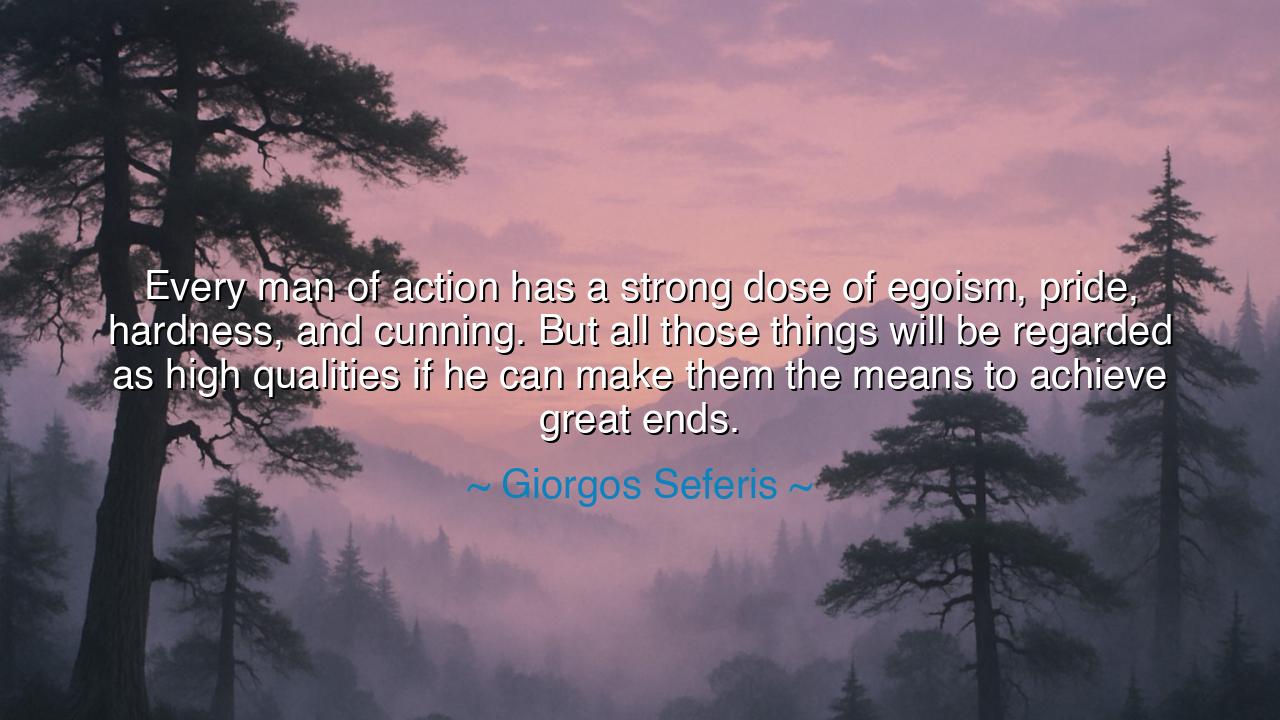
Every man of action has a strong dose of egoism, pride, hardness
Every man of action has a strong dose of egoism, pride, hardness, and cunning. But all those things will be regarded as high qualities if he can make them the means to achieve great ends.






“Every man of action has a strong dose of egoism, pride, hardness, and cunning. But all those things will be regarded as high qualities if he can make them the means to achieve great ends.” — Giorgos Seferis
Thus spoke Giorgos Seferis, the poet-diplomat of Greece, whose pen carried the weight of ancient truth wrapped in modern thought. His words pierce the veil of moral simplicity and reveal the paradox of human greatness: that even our flaws — egoism, pride, hardness, and cunning — can be transfigured into virtues when they are bound to great ends. In these few lines, Seferis reminds us that to act in the world — to shape it rather than merely endure it — one must wield both the light and shadow within. The man of action must possess strength of will, and that strength is seldom gentle.
Seferis wrote during a time of turmoil and transformation — the twentieth century, when Greece stood between the ruins of war and the rebuilding of identity. As a diplomat and a poet, he saw both the grandeur and corruption of power. He knew that no empire, no movement, no deed of lasting significance was ever achieved by the timid. The ego that drives a man to leave his mark upon the world can become arrogance if left unchecked, but when mastered, it becomes purpose. The pride that isolates can, when purified by duty, become dignity. The hardness that wounds can become endurance, and cunning, which in lesser men turns to deceit, can in the wise become foresight.
This, then, is the heart of Seferis’s teaching: that virtue and vice are not separate realms, but twin forces within the same soul. The difference lies not in their nature, but in their direction. To act greatly, one must harness the wild horses of self — ego, pride, strength, cunning — and yoke them to a higher cause. Without control, they run rampant; with control, they draw the chariot of destiny. The same fire that destroys a city can forge a sword. The same ambition that corrupts a tyrant can drive a reformer to uplift nations.
Consider the life of Alexander the Great, a son of Greece whom Seferis surely knew well in history and in spirit. Alexander’s egoism was boundless; he believed himself destined for godhood. His pride was fierce, his hardness relentless, his cunning unmatched. And yet, through these very traits, he built one of the greatest empires the world has ever known, spreading not only conquest but culture — a vision of unity under the banner of Hellenic thought. Had he lacked those traits, he would have remained a forgotten prince; had he not guided them toward greatness, he would have been remembered only as a tyrant. It was his will to use his own excess for a great end that turned him from a mere conqueror into a legend.
Seferis’s wisdom is thus both warning and revelation. For he knew that greatness is a perilous path, and that power without purpose turns noble qualities into poison. Many have possessed the traits of the man of action, but few have sanctified them through service to something beyond themselves. Napoleon, Caesar, even modern leaders — each carried within them the same furnace of ego and drive. Some burned to ash; others illuminated the world. What separates the two is not what they were made of, but what they lived for.
Let this, then, be the lesson: do not seek to purge yourself of ego, pride, or ambition, but to govern them. The ancient Greeks taught that moderation — sophrosyne — was the highest virtue, the balance between passion and wisdom. To suppress the fire is to lose life’s energy; to let it rage unchecked is to lose one’s soul. But to guide it toward great ends — justice, truth, creation, service — is to become a maker of destiny.
So, my child of the future, remember: the world does not honor the timid heart, nor the reckless one, but the heart that burns with purpose and discipline. When egoism drives you, let it drive you to excellence, not vanity. When pride rises, let it be pride in integrity, not dominance. When hardness comes, let it guard your spirit, not close it. And when cunning whispers, let it serve wisdom, not deceit. For every man of action is both beast and angel — but the great man is he who takes what is wild within himself and turns it into light for others to follow.






AAdministratorAdministrator
Welcome, honored guests. Please leave a comment, we will respond soon